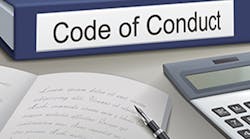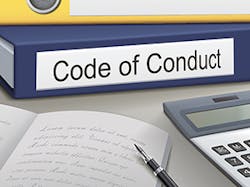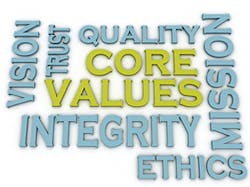Judging from the response of my last HotMail article, interest is high with better companies looking to create their own Code of Ethics or Conduct. Let’s look at some steps you could follow to create a code for your company. I’m convinced the value of this work will pay big dividends in influencing the proper conduct of everyone in your company.
What is a Code of Ethics?
A Code of Ethics, also called a Code of Conduct, is a document created to establish the culture, feeling, and expectations for each member of your company. This document sets requirements and benefits that offer a standard that all team members can be held accountable to live by.In companies with no Code of Ethics, these principles are only implied and assumed. Unfortunately, in these circumstances, what is expected of employees often depends on the immediate mood of the boss, or the circumstances you’re wading through at the moment. The result is a constantly changing set of pseudo rules and an unclear picture of what actions are right and which are wrong. A well-written code provides clear guidance as to what is expected of everyone.
If your company wrestles with constantly changing rules, the time is right for you to develop a code of conduct.
Decide What your Company Believes In
You might think this sounds a little goofy before you complete this exercise. As you write down what your company really believes in, you’ll begin to recognize that the day-to-day actions of each employee are driven by the beliefs they each hold.
While you can’t control what people believe when it comes to ethics, by writing down expectations in your code, you set the standard for employment in your company. When hiring, making daily decisions, promoting, or disciplining, there will be a written standard that you can point to.
If employees fail to comply with any part of that set of beliefs and conduct, their actions can be corrected based on that standard. If correction fails, the standard can be used to make needed adjustments in employment.
Get Buy-in From Others
This isn’t a two-hour project or a document you whip out in an afternoon to beat up a poorly performing employee. The document should take time to develop and should include input from others within the company. Invite key employees to share their ideas and vision of what the code of ethics should contain. Share this article with to help them understand the mission.
Involving others should not be taken lightly. Their input, when given heartfelt consideration, will result in a far superior document with buy in from the team. Remember this guiding document is intended to support the growth and purpose of not just the company, but of everyone in the company as well.
By involving others, it becomes clear the code applies to everyone in the company. Since our industry has many family-owned companies, the message must be clear that family members are held to the same standards as everyone else. If they don’t, the company culture will crumble.
In other words, every person in the company will be held accountable to a higher standard of performance.
What to Include in Your Code
With you team assembled, begin to draft your Code of Conduct. Your goal is to write a document matching your company. For smaller companies in our industry, a single page code is usually adequate.
Should your code become too lengthy or high minded, no one will read it much less abide by it. Set expectations in advance to assure it will be used, make sure it’s not too vague or too specific. Keep in mind this code must apply to each person in your company and is intended to impact each of your customers as well. It must be a standard that connects to a wide variety of situations across your company.
Mission and Purpose Statement -- Launch your code with a statement expressing the core mission and purpose of your company. Example statements to work from may include:
- We are committed to be a company well-known in our community for its exceptional service, integrity, and the understanding of our customer’s needs
- Our company clearly understand our customers’ needs and wants. We provide them with diagnostics and recommendations allowing them to make informed decisions
- We will ensure value to our customers through quality engineering and craftsmanship delivered by skilled professionals.
- We will delight our customers and exceed customer expectations at every level.
State the Purpose of Your Code -- Describing the purpose of your code of conduct will require time, effort, and precise wordsmithing until you believe the result can be embraced by those at all levels of the company. The purposes of your code may contain statements like the following:
- To provide a clear set of standards influencing our day-to day-conduct…
- For the purposes of establishing a culture of right and wrong in this company…
- To the standards for daily conduct and decision making, we establish this code of conduct.
- To encourage and enforce standards of ethics and appropriate behavior for everyone in this company, we offer….
You may choose to segment your code into several sections featuring conduct appropriate with certain business activities.
Principles Governing Internal Company Relationships -- This section of your code may establish standards for molding the internal relationships between those employed by the company.
- A description of character traits required for employees
- Respect for the law
- Attention to safety and compliance with industry regulations
- Ongoing training and certification
- A description of the company philosophy for personal advancement.
fairness, integrity, and honesty that is to prevail in the company during daily interactions with customers. The principle governing customer relations may include:
- We embrace fair competition. We advertise, promote, and market truthfully and accurately…
- We take the time and effort to accurately and truthfully diagnose system performance…
- We fully educate customers about our recommendations and options…
- We will always secure pricing approval before performing work…
- Should additional costs be incurred, we will get permission in advance from our customers…
- The use of drugs and alcohol are strictly prohibited…
- Our company will maintain comprehensive service records and reporting
- At all times, we will show respect for our customers’ time, and be punctual…
- We will demonstrate respect for the sanctity of our customer’s homes…
Enforcement of the Code
While the statement of expectations for general conduct will help shape the actions of each employee and fashion good behavior, unless enforced, the impact will be seriously diminished.
Where appropriate, statements detailing when and how penalties for violating the code will be enforced must be included. You may also choose to describe situations where leniency may prevail.
To provide for needed direction in the future, a description of who to turn to for help is also very valuable. A section in your annual performance reviews can also be centered on your company code of ethics.
Your code is not intended to be a one-time announcement. You should include code training for all levels of your company. This will keep these principles at the top-of-mind as to constantly influence that thoughts and actions affecting the behavior of every person in the organization.
Rob “Doc” Falke serves the industry as president of National Comfort Institute -- an HVAC-based training company and membership organization. He would appreciate you sharing your company’s code. You can contact him at [email protected] or call him at 800-633-7058. Go to NCI’s website at nationalcomfortinstitute.com for free information, articles and downloads.












